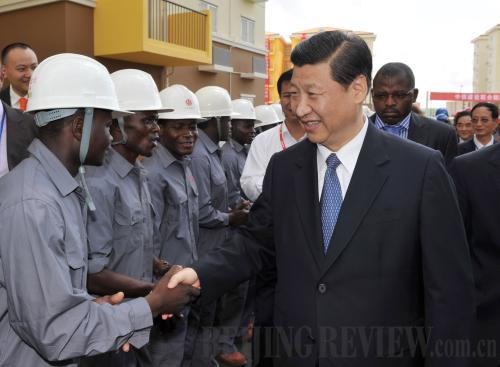|
 |
|
TEAM WORK: Chinese Vice President Xi Jinping greets local workers at China's CITIC site in Angola (HUANG JINGWEN) |
Chinese enterprises should take the time to integrate into African society, both culturally and financially and be aware of their corporate responsibility. Chinese Vice President Xi Jinping made this clear while meeting Chinese businessmen during a recent visit to Angola.
Against the backdrop of economic globalization and China's reform and opening up, as well as decades of development, Africa has now become an important stage for China's "going out" strategy. In 2009, China surpassed the United States as Africa's biggest trading partner with a trade volume of $91.2 billion. The number of Chinese enterprises in Africa has surpassed 2,000, with a total investment of more than $30 billion. Africa has become China's fourth largest overseas investment destination.
However, amid the rapid development of China-Africa economic and trade cooperation, problems have also come to light. One of the most frequently discussed problems is corporate responsibility on the part of Chinese enterprises in Africa. This problem exists, but should be regarded in a comprehensive and fair manner. In the meantime, both sides should actively seek solutions so as to strengthen the foundation of China-Africa relations.
Contributions
In terms of economic and trade cooperation, which is an important part of China-Africa relations, China adheres to the principle of mutual benefit. In addition, it does not attach political conditions to its economic relationships. China has obtained political and economic benefits through its cooperation with African countries. At the same time, however, it is also concerned with the interests of African countries and helps them achieve real benefits.
Chinese enterprises have constructed a large number of roads, railways, ports and other infrastructure in Africa. To be specific, they have completed more than 2,000 km of railways and more than 3,000 km of roads. This infrastructure has greatly boosted local social and economic development.
In addition, China has begun building six economic and trade cooperation zones in five African countries - Zambia, Egypt, Mauritius, Nigeria and Ethiopia. These zones have injected new vitality into Africa's industrialization. The success of China-Africa economic and trade cooperation has been widely supported not only by African countries, but also by more and more politicians in Western countries.
This year, Jean-Francois Cope, head of France's ruling party, the Union for a Popular Movement, stated that China's success in Africa should prompt French people and even the whole Western world to reconsider their own practices, and they should eschew a stance of moral criticism.
Africa began to have an impact on the world stage beginning in the period 2002-08 when it enjoyed an average annual growth rate of 6 percent. China was responsible for one third of this total growth. Take Sudan for example. This oil-rich country has experienced long-term poverty. It lacked electricity and had to import refined oil. In the mid-1990s, the China National Petroleum Corp. (CNPC) set up operations in Sudan from scratch. Since then, it has helped Sudan establish a complete and integrated modern oil industry.
Sudan has changed from being an importer to an exporter of refined oil, and its former fiscal deficit is now a surplus. Currently, Sudan earns more than $4.5 billion each year from oil projects developed by the CNPC. This revenue has greatly promoted Sudan's economy. What's more, these projects have altogether provided more than 20,000 jobs for local people, increased their incomes and greatly enhanced their standard of living.
Chinese enterprises have also made big contributions to Africa's telecom industry. The two major Chinese telecom equipment manufacturers ZTE and Huawei are active in 50 African countries, providing communications services for over 300 million African users. They have established more than 40 third-generation telecom networks in more than 30 African countries, and built national fiber-optic communications networks and e-government networks for more than 20 African countries.
The entry of Chinese companies into the market has broken the monopoly of Western telecom giants and dramatically reduced telecom charges. As a result, mobile phones have quickly gained popularity and ordinary Africans have benefited.
|